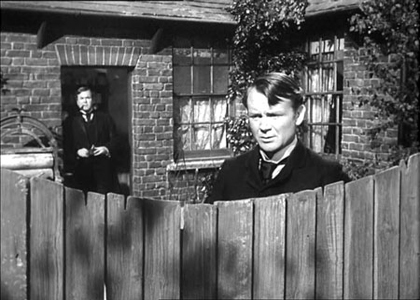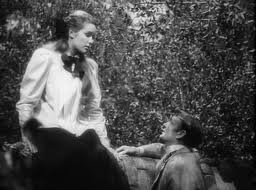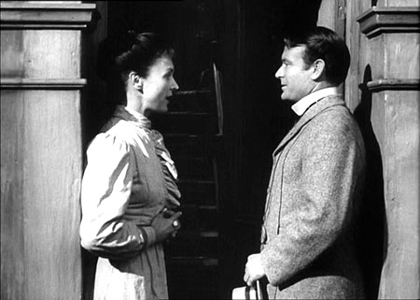
 |
|
|
|
His fame and finances secured by his immensely popular "scientific romances" The War of the Worlds, The Time Machine, The Invisible Man and The Island of Dr. Moreau, author H.G. Wells turned to non-fiction books promoting his progressive and socialist ideas. He also found time to write a series of semi-autobiographical novels about social barriers and the stifling limits placed on members of the lower middle class. Mr. Hoopdriver in The Wheels of Chance and Arthur Kipps are mild-mannered dreamers who would like to better themselves. Written in 1910, Wells' The History of Mr. Polly is a comic look at a fellow who simply wants to get on in life, yet soon grows dissatisfied with the options open to him. Author Wells may be nothing like his passive, rather confused hero Alfred Polly, but they share a number of biographical particulars. 
In 1949 actor John Mills, flush from success as Pip in David Lean's Great Expectations, teamed with the high-toned writer Anthony Pélissier under the prestigious banner of Two Cities Films. Pélissier wrote and directed while Mills produced and took the lead role of Alfred Polly. The resulting film hews closely to the lines of H.G. Wells story. Unable to focus on his job as a draper (=store clerk and window dresser), Alfred Polly loses his position because he's too caught up in novels about knights and fair ladies. Things look grim until word comes that his estranged father has died. Alfred has mixed feelings about that failed relationship. Returning home for the funeral, he finds friends and relatives suddenly more interested in him now that he has expectations of an inheritance. A trio of unmarried distant cousins sees him as potential husband material. Alfred rides a bicycle into the country to clear his head. There he encounters the spirited schoolgirl Christabel (Sally Ann Howes of Dead of Night and Chitty Chitty Bang Bang), and they carry on a chaste flirtation. Although he fancies Christabel, Alfred goes the way of least resistance and marries one of the cousins, the frankly surprised Miriam Larkins (Betty Ann Davies of Outcast of the Islands). Fifteen years later, Mr. and Mrs. Polly are miserable. Their shop is a failure, and he purposely alienates his customers and neighbor-shopkeepers. Miriam has become a nag. Polly's solution to his woes is to burn the shop down and do away with himself, so that Miriam will get the insurance money. He ends up rescuing the neighbor's wife instead and becomes a local celebrity. Disgusted at his inability to do anything right, Alfred leaves his wife the insurance money and disappears. As if by a stroke of fate, he runs into a friendly, warm Innkeeper (Megs Jenkins of The Innocents) who immediately offers him a job as handyman and operator of a small ferry. Polly thinks he has found peace until the Innkeeper's no-good relation Uncle Jim (Finlay Currie) shows up, threatening to beat the new man senseless if he doesn't clear out. But for once the spineless Alfred decides to stand his ground. Producer-actor John Mills was clearly intrigued by the opportunity to create a great characterization in The History of Mr. Polly. If the film had found a tone to match Polly's perpetual befuddlement, it might have become a classic. Alfred Polly has just enough education to realize that he's not going to fit into the social pigeonholes expected of him, at a level where the ultimate goal is to own a quiet little shop instead of work for one. While his fellow employees elbow each other for advantage, Alfred is late to work because he's too caught up in his latest adventure book. 
An inoffensive but mediocre everyman, Mr. Polly is hopelessly unfocused and indecisive. The sudden inheritance allows him to breath easy for a few weeks. His illicit meetings with the mischievous Christabel are a fruitless flight of fancy, as the schoolgirl is clearly fated for a younger and better-off husband. Alfred's sudden proposal to the least vivacious of the Larkins sisters is a meek surrender to the tyranny of reality. Stuck in a straitjacket of bourgeois conformity, Polly makes both himself and Miriam miserable, until he decides to end it all. Alfred Polly's predicament reflects H.G. Wells' own youth. His father's poor health forced Wells' mother to take a job as a maid. She was required to live apart from her husband and the children had to be "apprenticed out"; the family essentially broke up. Wells apprenticed as a draper for a short time and for several years moved fitfully from job to job. In Wells' case, "impractical dreaming" became a key to success. His dissatisfaction with the social system and his science education figure strongly in his early writing efforts. The impoverished student/teacher became an overnight literary sensation. Wells' popular character Kipps is an impoverished clerk that experiences difficulties with sudden wealth. In terms of characterization The History of Mr. Polly is a rousing success. John Mills is a stunningly clueless Alfred, always lost in interior thought when a situation calls for a simple decision. He imagines himself a knight in shining armor, and uses that theme in his romantic play with the underage Christabel. He talks to himself, making up words as he goes: "This is positively arsonical!" Sally Ann Howes is a privileged delinquent, and Alfred can count himself fortunate that nobody finds out about the relationship and misinterprets it. Betty Ann Davies can't believe her luck when Alfred "chooses her" for his own, but the marriage changes her into a bitter harpy. The light at the end of the tunnel is the adorable Megs Jenkins, the unnamed Innkeeper who offers him a welcoming smile and honest work in the country air. Polly finally finds something he wants, and regains his self-respect by fighting for it. In 1949 the British Ealing comedies were entering their most popular phase. The History of Mr. Polly played well to English audiences of the day but its tentative position between comedy and drama can be confusing. The movie certainly makes light of its serious scenes, as when Polly rescues a deaf old lady during the big fire, and she sits on the roof happily enjoying the excitement. The fairly serious story is not an Ealing-style satire: it can be droll, but it never becomes a farce. The only issue at stake seems to be Mr. Polly's personal destiny. He isn't a symbol for the working class and he isn't a slapstick buffoon (the foolish battle with Uncle Jim excepted). There seems to be some deeper unhappiness in John Mills' Mr. Polly that is never addressed. The character's idea of success is to stumble his way into a safe haven from the troublesome outside world. Traditionally burdened with too much work and not enough opportunity, the British middle class must have seen Mr. Polly's petty victory as a triumph. 
The handsome show is given top-rank production values, with Desmond Dickenson's cinematography establishing a strong contrast between scenes in the verdant English countryside and the cramped little rooms where Mr. Polly must live. William Alwyn contributes a spirited music score. Director Pélissier may not be as precise or as visually expressive as David Lean, but his work communicates the spirit of H.G. Wells' amusing characters. As a special treat, we get to see John Mills' talented daughter Juliet (Nanny and the Professor, Billy Wilder's Avanti!) at age seven or eight. She plays the Innkeeper's young niece. VCI's DVD of The History of Mr. Polly is a good transfer of a better-than-adequate source for this minor English classic. The image is a bit light at times but the audio track is always strong. John Mills' production was the first H.G. Wells story to be adapted to the screen after the author's death in 1946. It has seen a score of television versions over the years, including several BBC serializations. The latest was broadcast in 2007 and starred Lee Evans.
On a scale of Excellent, Good, Fair, and Poor,
The History of Mr. Polly rates:
Reviews on the Savant main site have additional credits information and are often updated and annotated with reader input and graphics. Also, don't forget the 2011 Savant Wish List. T'was Ever Thus.
Review Staff | About DVD Talk | Newsletter Subscribe | Join DVD Talk Forum |
| ||||||||||||||||||